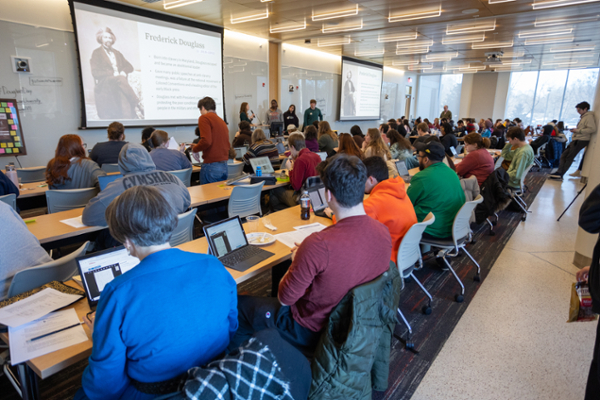Students, faculty and staff take part in national Douglass Day transcribe-a-thon
Students, faculty and staff take part in national Douglass Day transcribe-a-thon

Deciphering history during Black History Month.
That was the goal Feb. 14 when more than 100 students, faculty and staff took part in a nationwide transcribe-a-thon for letters to abolitionist, orator, statesman and journalist Frederick Douglass.
Meeting in Business Hall for the second annual Douglass Day transcribe-a-thon at Rowan University, the project, started by the Center for Black Digital Research at Penn State, involved transcribing handwritten letters housed online in the Library of Congress to make them searchable and usable by historians.
“This is a national project, with hundreds of schools and more than 7,000 individuals participating,” said Dr. Jessica Mack, an assistant professor of history in the College of Humanities & Social Sciences (below, right).

Leading Rowan’s role in the transcribe-a-thon for the second consecutive year, Mack initiated the crowdsourced project for her Digital History class.
“This year we’re transcribing the letters of Frederick Douglass himself, mostly letters to him,” Mack said. “And we learn a lot from them – about his professional networks, his personal relationships, his family, his children. There are over 8,000 letters, and everyone (taking part across the country) is looking at the same collection.”
Mack said transcribed letters will become part of the collection on the Library of Congress website, “where they’ll be searchable so people can analyze them in new ways.”
Working at laptops, participants pored over letters to Douglass, a towering 19th Century figure who, after escaping slavery at age 20, left an indelible mark on history.
A passionate and prolific public speaker, Douglass was a tireless advocate for formerly enslaved people’s rights who penned three autobiographies and became a friend to President Abraham Lincoln.
“Douglass’s writing and speaking shaped how we think about freedom and democracy in the U.S. today,” Mack said.
Douglass did not know his actual birthday but chose to recognize it on Feb. 14, which has come to be called Douglass Day. To celebrate, transcribers enjoyed a custom cake from Kreamie’s Bakery, a Black-owned business in Bellmawr.
For participants, the assignment to review and transcribe uploaded letters was straightforward, but the execution sometimes less so. Challenges included deciphering sometimes-florid 19th Century handwriting styles made more difficult to comprehend by the age of the letters and, at times, by the writers’ use of language.
Challenges aside, participants said the direct connection to history made it great.
“We’re doing something that historians will look back on and use,” said first-year political science major Oju Odusanya.
Junior history major Christian Mammarella-Pietrafitta said he recently read Douglass’s first autobiography, “Narrative of the Life of Frederick Douglass, an American Slave,” and it made a big impact.
“I learned a great deal,” he said. “For example, the more religious a slaveholder was, the worse his treatment (of enslaved people) seemed to be.”
Professor of Public History Dr. Jen Janofsky said studying Douglass, whether through letters to him or from his own words, can be a powerful window into events that shaped the nation.
Recommending his autobiography, Janofsky said, “readers walk away with the power and strength of his life.”
She noted that Douglass secretly learned to read and write, skills he used to find freedom, and was an early master of photography.
“If he was around today, he’d be a social media king,” she said.